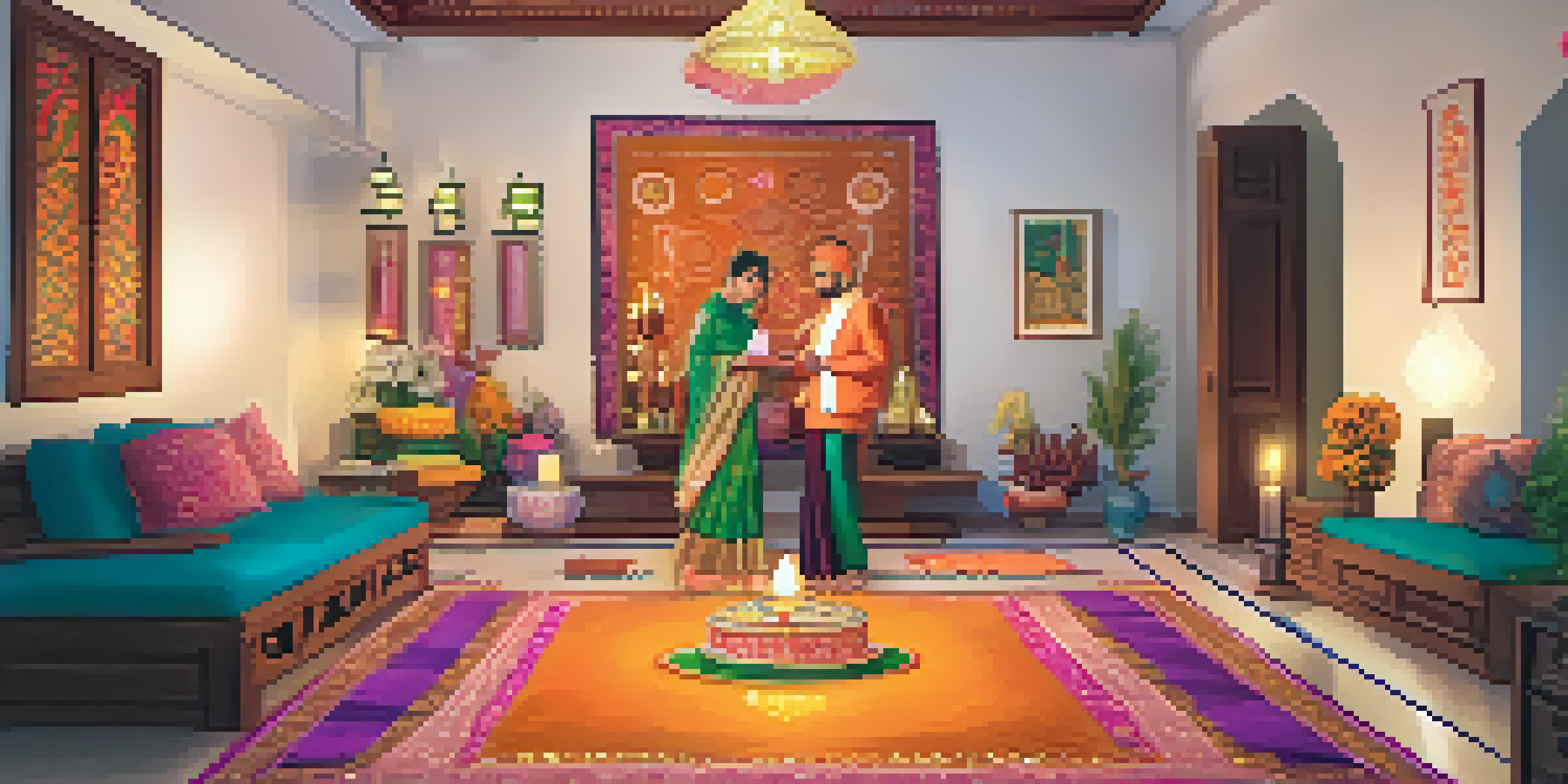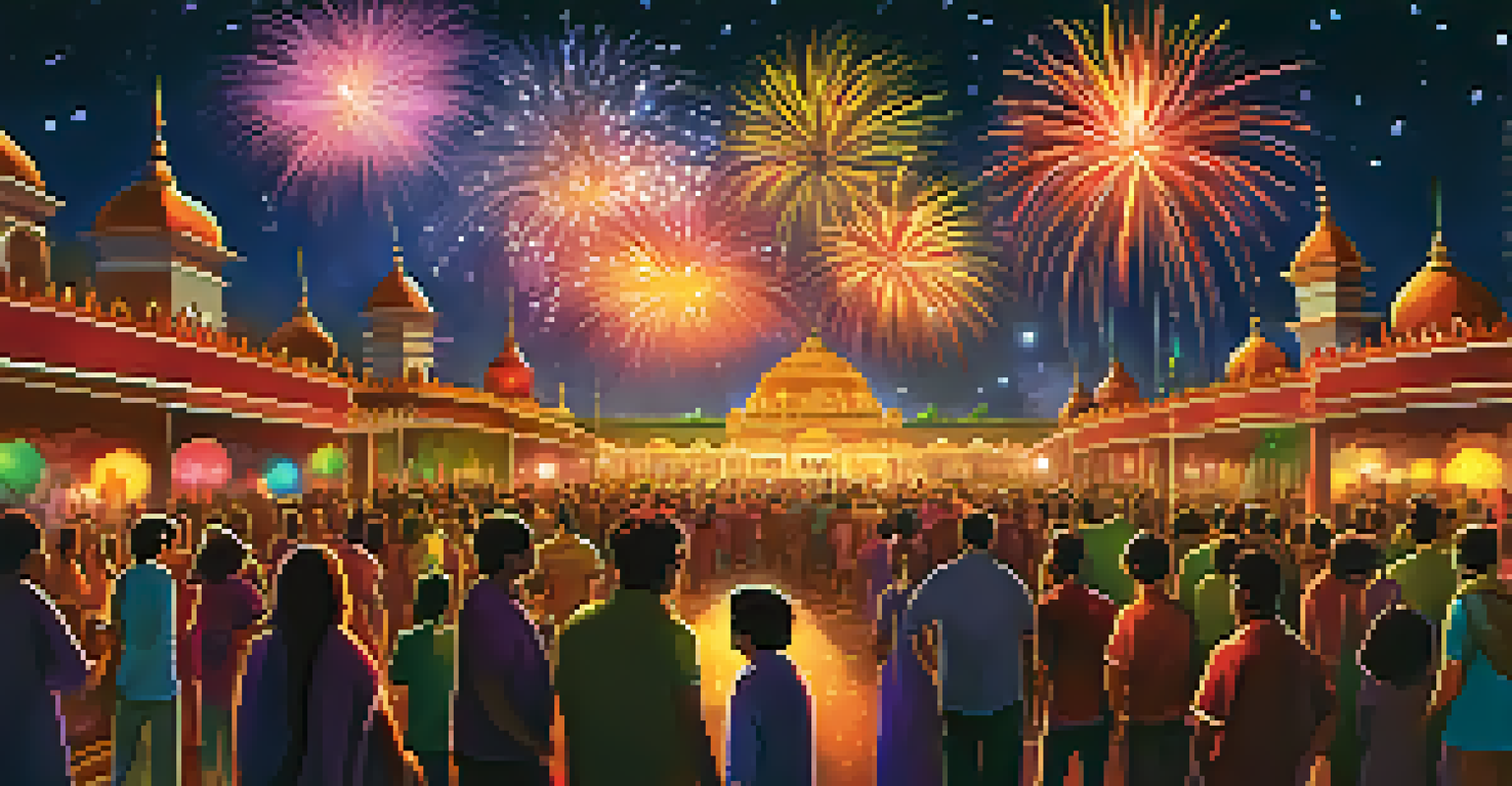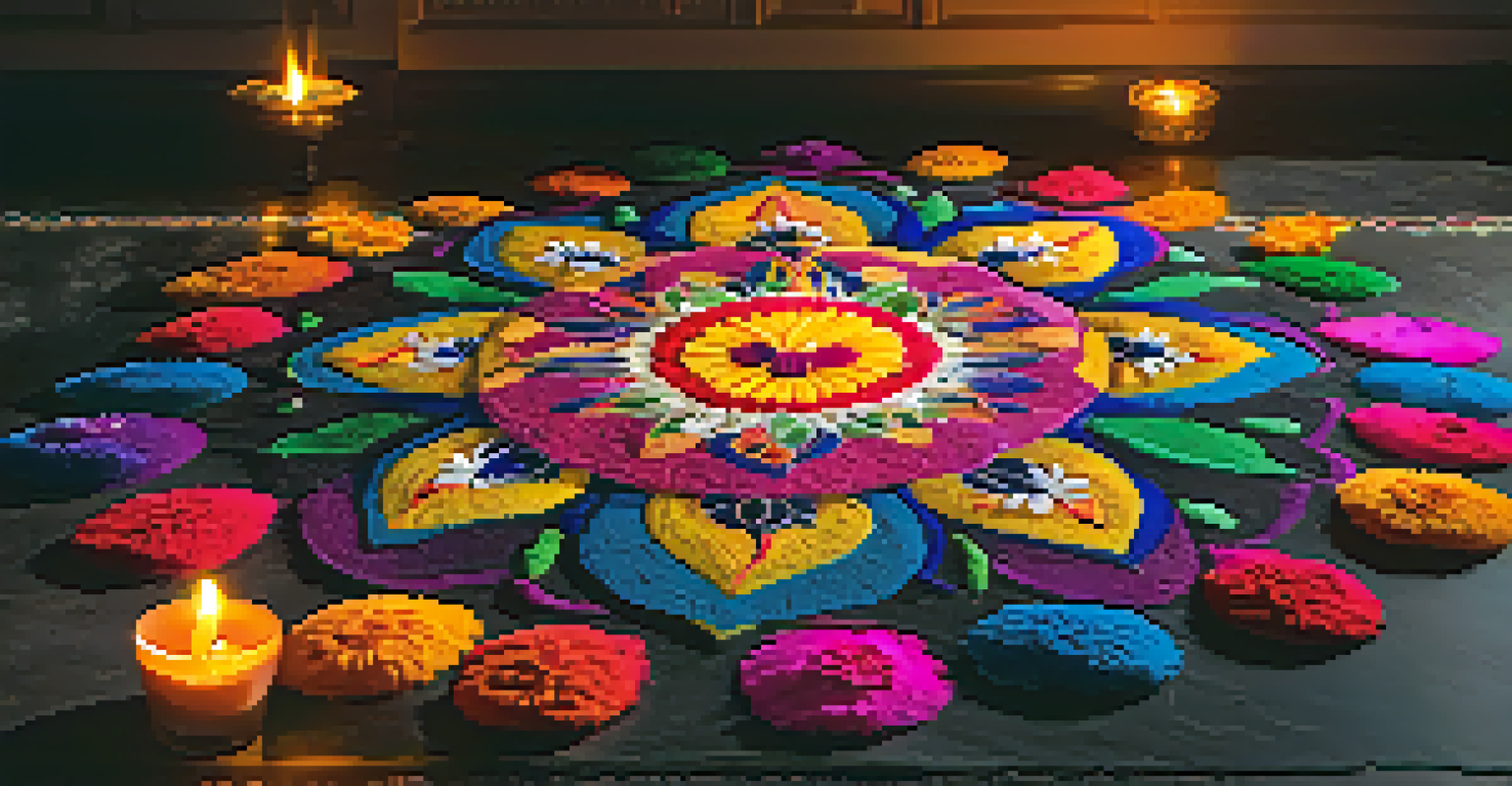The Rich Heritage of Diwali: Festival of Lights Explained

Understanding the Essence of Diwali
Diwali, also known as the Festival of Lights, is one of the most celebrated festivals in India and among Indian communities worldwide. This joyous occasion symbolizes the victory of light over darkness and good over evil. Each year, millions of people come together to celebrate with family and friends, filling the air with laughter and joy.
Diwali is a reminder that light can overcome darkness, and that love can conquer hate.
The festival usually lasts five days, with each day holding its own unique significance and rituals. From cleaning and decorating homes to lighting oil lamps and bursting firecrackers, the preparations begin well in advance. It’s a time for renewal, reflection, and reconnecting with loved ones, making it a truly special occasion.
Diwali is steeped in rich cultural traditions that vary from region to region. While Hindus celebrate the return of Lord Rama to Ayodhya, Jains commemorate Lord Mahavira's attainment of nirvana, and Sikhs honor the release of Guru Hargobind Ji from captivity. This diverse tapestry of beliefs adds depth to the festival, making it relatable to many.
The Historical Significance of Diwali
The origins of Diwali can be traced back thousands of years, with historical references found in ancient scriptures. It is believed that the festival celebrates various legends, including the triumph of Lord Rama, the slaying of the demon king Ravana, and the goddess Lakshmi's arrival on Earth. These stories emphasize the importance of righteousness and moral values.

In addition to its mythological roots, Diwali also marks the end of the harvest season in many regions. Farmers express gratitude for a bountiful crop and seek blessings for future prosperity. This agricultural aspect of the festival underscores the connection between nature and human life, highlighting the importance of sustainability and gratitude.
Diwali Celebrates Light and Unity
This festival symbolizes the victory of light over darkness and encourages communal bonding through shared traditions.
As time has passed, Diwali has evolved into a universal celebration of positivity and hope. Its historical significance has paved the way for modern-day festivities, where people from various backgrounds come together to partake in the joyous rituals, fostering a sense of community and unity.
Diwali Preparations: A Labor of Love
Preparing for Diwali is an elaborate affair filled with excitement and anticipation. Homes are cleaned and adorned with colorful rangoli designs, intricate patterns made from colored powders, flowers, and rice. This artistic expression not only beautifies the space but also symbolizes welcoming prosperity and good fortune into the home.
The festival of lights is a celebration not just of the victory of good over evil, but of the joy and unity that comes from sharing with others.
Shopping for new clothes and gifts is another integral part of the preparations. Families often choose to wear ethnic attire, showcasing vibrant colors and intricate designs. Exchanging gifts with friends and relatives fosters goodwill and strengthens bonds, reminding everyone of the importance of love and generosity.
Food plays a central role in Diwali celebrations, with families preparing a variety of traditional sweets and snacks. From mouthwatering ladoos to crispy samosas, these delicacies represent the sweetness of life and the joy of sharing. The aroma of freshly cooked treats fills the air, creating a festive atmosphere that brings everyone together.
The Spiritual Significance of Diwali
Diwali is not just a celebration of lights; it is also a time for spiritual reflection and growth. Many people take this opportunity to engage in prayers and rituals, seeking blessings from deities for prosperity, health, and happiness. Lighting oil lamps, or diyas, during prayers symbolizes the dispelling of ignorance and the illumination of the soul.
Moreover, Diwali serves as a reminder to cultivate inner strength and resilience. The festival encourages individuals to overcome personal challenges and strive for a better version of themselves. This spiritual journey resonates deeply with many, fostering a sense of purpose and direction.
Rich Cultural and Spiritual Traditions
Diwali's diverse customs reflect various cultural beliefs while promoting spiritual growth and resilience among individuals.
As families come together to pray and celebrate, it strengthens their spiritual bonds and instills values of compassion and kindness. The essence of Diwali lies in promoting positive energy and spreading joy, making it a holistic experience for everyone involved.
The Role of Lights in Diwali Celebrations
The most striking feature of Diwali is undoubtedly the lights that illuminate homes and public spaces. From flickering diyas to dazzling fireworks, the sight is truly enchanting. The use of lights symbolizes the triumph of knowledge and wisdom over ignorance and darkness, creating an atmosphere of hope and joy.
In many regions, families decorate their homes with strings of electric lights and lanterns, turning neighborhoods into vibrant spectacles. This collective effort fosters a sense of community and shared celebration, as people come together to appreciate the beauty of their surroundings. The lights also serve as a beacon of hope, guiding individuals towards positivity.
Fireworks are another thrilling aspect of Diwali celebrations. While they add to the festive spirit, they also represent the joy and excitement of the occasion. However, it's essential to celebrate responsibly, considering both the environment and the well-being of local communities, ensuring that the essence of Diwali remains intact.
Diwali Around the World: A Global Celebration
While Diwali has its roots in India, it has transcended borders to become a global festival. Countries like Nepal, Sri Lanka, Malaysia, and even the United States celebrate Diwali with unique local customs and traditions. This global phenomenon showcases the festival's universal appeal and ability to bring people together regardless of cultural differences.
In many cities around the world, public celebrations feature cultural performances, food stalls, and elaborate decorations that reflect the spirit of Diwali. These events not only allow people to celebrate their heritage but also educate others about the significance of the festival, fostering intercultural understanding and respect.
Modern Adaptations and Sustainability
As Diwali evolves, contemporary practices focus on eco-friendly celebrations, ensuring the festival remains relevant for future generations.
The diaspora community plays a crucial role in keeping the traditions of Diwali alive, often organizing events that highlight the festival's rich heritage. By sharing their customs and practices, they create a sense of belonging and connection, ensuring that the essence of Diwali continues to thrive across generations.
The Future of Diwali: Embracing Change
As the world evolves, so does the way we celebrate Diwali. While traditional rituals remain central to the festival, contemporary interpretations have emerged, allowing for a blend of old and new. This evolution reflects changing lifestyles and values, showcasing the adaptability of cultural practices.
Sustainability has also become a focal point in modern Diwali celebrations. Many individuals are now opting for eco-friendly decorations and reducing the use of fireworks to minimize environmental impact. This conscious shift towards greener practices demonstrates a collective responsibility towards the planet, ensuring that future generations can enjoy the festival.

Ultimately, the spirit of Diwali will always remain unchanged—a celebration of light, love, and unity. By embracing both tradition and innovation, we can create a richer and more inclusive experience for everyone, allowing the festival to thrive in an ever-changing world.